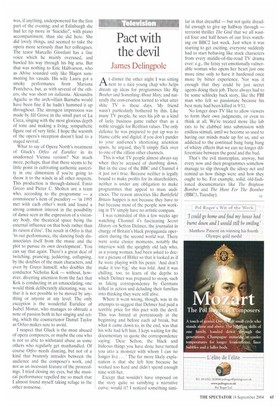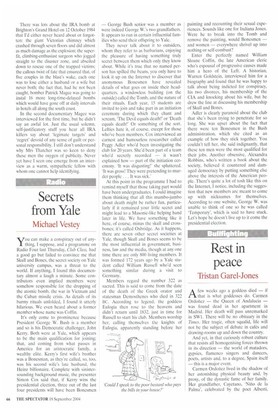Pact with the devil
James Delingpole
At dinner the other night I was sitting next to a nice young chap who helps dream up ideas for programmes like Big Brother and Something About Mary, and naturally the conversation turned to what utter shite TV is these days. My friend wasn't particularly bothered by this. Like many TV people, he sees his job as a kind of larky business game rather than as a noble struggle for Reithian values. The only defence he was prepared to put up was to blame cable and digital: if you don't pander to your audience's shortening attention spans, he argued, they'll simply flick over to one of the zillion other channels.
This is what TV people almost always say when they're accused of dumbing down. But in the case of the BBC and Channel 4 it just isn't true. Because neither is legally bound to make profits for its shareholders, neither is under any obligation to make programmes that appeal to mass audiences. The reason atrocities like Battlefield Britain happen is not because they have to but because most of the people now working in TV simply have no artistic compass.
I was reminded of this a few weeks ago watching Channel 4's fascinating Secret History on Sefton Delmer, the journalist in charge of Britain's black propaganda operation during the second world war. There were some choice moments, notably the interview with the sprightly old lady who, as a young woman, had been asked to doctor a picture of Hitler so that it looked as if he were playing with his penis: 'And don't make it too big,' she was told. And it was chilling, too, to learn of the depths to which Delmer was prepared to stoop, such as faking correspondence by Germans killed in action and deluding their families into thinking they were still alive.
Where it went wrong, though, was in its attempts to suggest that Delmer had paid a terrible price for this pact with the devil. This was hinted at portentously at the beginning and before each ad break, but what it came down to, in the end, was that his wife had left him. I kept waiting for the documentary to quote the correspondence saying: 'Dear Sefton, the black and hideous things you have done have turned you into a monster with whom I can no longer live ... ' The far more likely explanation is that she left him because he worked too hard and didn't spend enough time with her.
Except that wouldn't have imposed on the story quite so satisfying a narrative curve, would it? I noticed something simi
lar in that dreadful — but not quite dreadful enough to give up halfway through — terrorist thriller The Grid that we all wasted four and half hours of our lives watching on BBC2 last week. Just when it was starting to get exciting, everyone suddenly had to start behaving like stock characters from every middle-of-the-road TV drama ever: e.g., the feisty yet emotionally vulnerable woman who opens her heart just one more time only to have it hardened once more by bitter experience. Nor was it enough that they could be just secret agents doing their job. There always had to be some schlocky back story, like the FBI man who felt so passionate because his best mate had been killed in 9/11.
No longer does TV like to allow viewers to form their own judgments, or even to think at all. We're treated more like lab rats to be clubbed into submission with endless stimuli, until we become so used to having our minds made up for us, and so addicted to the continual bang bang bang of w-hizzy effects that we can no longer differentiate between the good and the bad.
That's the evil masterplan, anyway, but every now and then programmes somehow manage to slip through the idiocy net and remind us how things were and how they ought to be. For example, solid, old-fashioned documentaries like The Brighton Bomber and The Hunt For The Bomber (BBC1, Tuesday). There was lots about the IRA bomb at Brighton's Grand Hotel on 12 October 1984 that I'd either never heard about or forgotten: the giant Victorian chimney which crashed through seven floors and did almost as much damage as the explosion; the superfit, climbing-enthusiast surgeon who jogged straight to the disaster zone, and abseiled down to rescue one of the trapped victims; the callous twist of fate that ensured that, of five couples in the blast's wake, each one was to lose either a husband or a wife but never both; the fact that, had he not been caught, bomber Patrick Magee was going to instal 16 more long-time-delayed bombs which would have gone off at daily intervals in hotels all along the south coast.
In the second documentary Magee was interviewed for the first time, but he didn't say an awful lot. Just the usual solemn, self-justificatory, stuff you hear all IRA killers say about 'legimate targets' and 'regret' devoid of any sense of guilt or personal responsibility, still don't understand why Mrs Thatcher was so keen to deny these men the oxygen of publicity. Never yet have I seen one emerge from an interview as a warm, sympathetic fellow with whom one cannot help identifying.



















































































 Previous page
Previous page